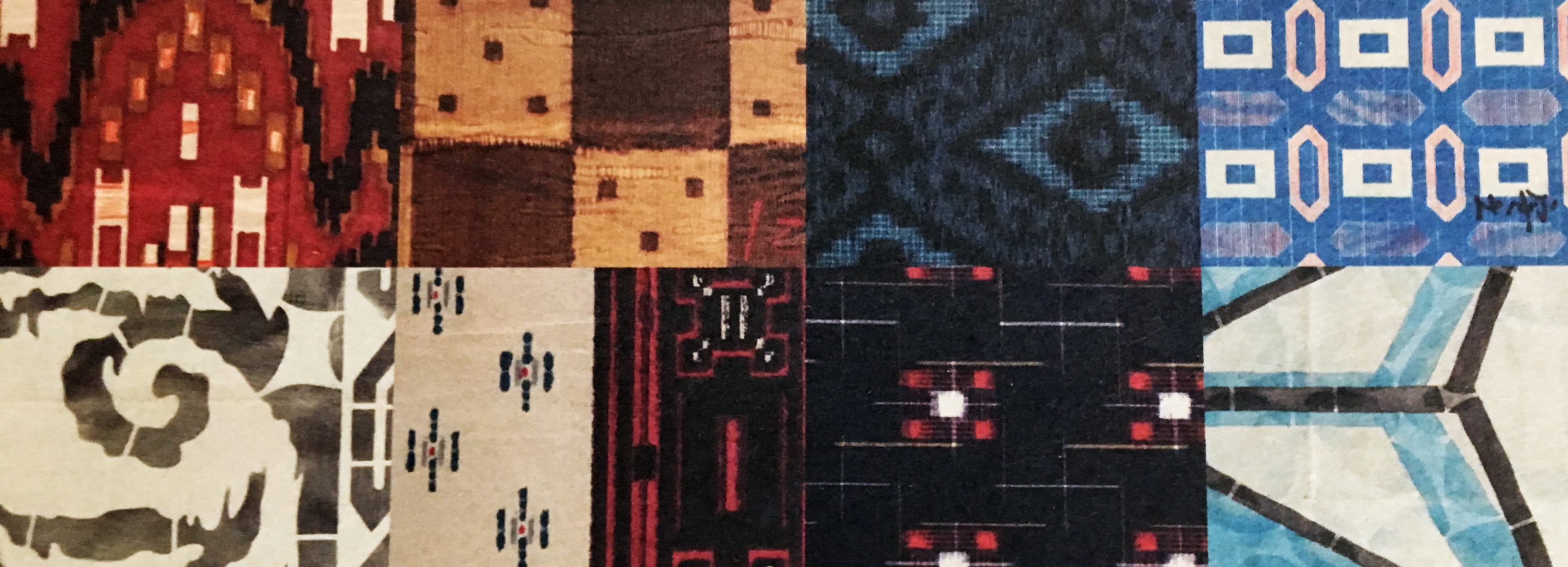HISTORY
沿革

COMPANY HISTORY
-
1893Sukejiro Kaihara started handwoven authentic indigo-dyed Bingo kasuri textile business in Tsune-Kanamaru-mura, Ashina-gun, Hiroshima (currently Tsune, Shinichi-cho, Fukuyama-shi) under the tradename ㋜ (marusu).
-
1951Established Kaihara Textile Mills Co., Ltd. with capital of 1.8 million yen, 34 looms and 83 employees.
Sukejiro Kaihara, Satoru Kaihara, and Sadaharu Kaihara appointed chairman, president, and senior managing director, respectively. -
1954Self-developed a submerged wringing automatic indigo dyeing machine (patented).
-
1956Developed 36-inch (90 cm)-wide width kasuri (trade name: NICHIBO KONNY) fabric by using the world’s first power loom.
-
1961Developed the world’s first 48-inch (122 cm)-wide “kasuri sarong,” and exported the folkwear (sarong: fabric wrapped around the waist like a long skirt) to Aden in the Middle East.
Started production of narrow wool kasuri for kijaku (standard cloth length for kimono) for the first time in the Bingo region (ordered by Toyo Cotton). -
1962Increased capital to 20 million yen with capital participation from Dainippon Boseki Co., Ltd.
Established Kaihara Sangyo Co., Ltd. (Capital: 1 million yen). -
1965Established the Hirohaba Kasuriori Cooperative Association (Capital: 1 million yen).
-
1968Excess inventory of kasuri sarongs (roughly one year’s worth) due to the suspension of L/C caused by political instability in Aden in the Middle East, devaluation of the British Pound, etc.
-
1969Discontinued production of kasuri sarongs due to continued suspension of L/C.
-
1970Satoru Kaihara and Sadaharu Kaihara appointed chairman and president, respectively.
Self-developed a continuous indigo dyeing machine (rope dyeing machine no. 1), and supplied denim made by rope dyeing to the market for the first time in Japan. -
1973Opened Joge Factory.
-
1974Established Denii Co., Ltd. (Capital: 50 million yen) (a fifty-fifty joint venture with Unitika Ltd. and Kaihara Textile Mills Co., Ltd.)
Started operation with 68 Toyota looms, Gu8. -
1975Concluded pollution control agreement with Shinichi-cho.
Completed construction of wastewater treatment facilities by activated sludge method. -
1976Achieved monthly production of 100,000 tans (bolts) of denim by rope dying, accounting for a 75% market share in dyeing in Japan.
-
1977Completed rope dyeing machine no. 8 and achieved monthly production of 120,000 tans of denim by rope dyeing.
-
1978Opened Kisa Factory; completed a weaving mill with 120 Sulzer looms.
-
1980Completed a finishing mill at Kisa Factory.
-
1982Completed a new weaving mill at Joge Factory and added Sulzer looms into a framework of 120 machines (a framework of 336 machines for the entire group).
-
1989Introduced dyeing and weaving KAPSS (sales support & production management system) at the Head Office, Kisa and Joge Factories.
-
1990Sadaharu Kaihara and Yoshiharu Kaihara appointed chairman and president, respectively.
-
1991Completed a spinning mill at Kisa Factory (started operation of the open-end spinning line.)
*This completed the integrated denim production line of spinning, dyeing, weaving, and finishing.
Changed the company name from Kaihara Textile Mills Co., Ltd. to Kaihara Corporation.
-
1992Held a commemoration ceremony for the 100th anniversary of foundation and erected a monument.
-
1993Started operation of the ring spinning line in the spinning mill at Kisa Factory.
-
1994Started full-scale production of “vintage” (selvedge) denim by using shuttle looms.
-
1995Introduced finishing KAPSS (sales support & production management system).
-
1996Opened the Kaihara Historical Museum.
-
2000Completed a warping & dyeing mill at Kisa Factory.
Established Marusu Kou Co., Ltd. (Capital: 50 million yen)
Acquired all shares of Kaihara’s stock owned by Unitika Ltd. -
2002Obtained ISO 9001 certification.
-
2003Sadaharu Kaihara, Yoshiharu Kaihara, and Junji Kaihara appointed adviser, chairman, and president, respectively.
-
2004Split the company into Kaihara Corporation as a sales & financing company, and Kaihara Sangyo Co., Ltd. as a manufacturing company.
-
2005Kaihara Sangyo Co., Ltd. merged with Denii Co., Ltd., and changed the company name to KAIHARA Co., Ltd. Completed a weaving mill at Sanwa Factory.
-
2008Completed a spinning mill at Sanwa Factory.
-
2009Transferred finishing operations from the Hirohaba Kasuriori Cooperative Association to KAIHARA Co., Ltd.
-
2012One year after the Great East Japan Earthquake, held a fashion show “GINZA RUNWAY” with the theme of “Japan Denim” for the purpose of re-energizing Japan from “Ginza,” a town representing Japan in cooperation with respective companies.
-
2014Junji Kaihara, Mamoru Kaihara, and Tadayuki Kaihara appointed vice-chairman, president, and senior managing director, respectively.
Established KAIHARA THAILAND Co., LTD. (KTC) in Thailand (production and sales). -
2015Completed KTC.
-
2017The Hirohaba Kasuriori Cooperative Association dissolved.
-
2018Held a commemoration ceremony for the 125th anniversary of foundation.
Replaced the effluent treatment facilities at the Head Office & Factory and removed the heavy-oil boiler facilities. -
2019Established KAIHARA International Co., Ltd. in Hong Kong (sales).
-
202050th anniversary of conversion to denim business.
-
2021Started crowdfunding at MAKUAKE.
Introduced solar power generation at Sanwa Plant. -
2022Started EC sales.
-
2023Marusu Kou Co., Ltd. Dissolved.
AWARD-WINNING HISTORY
-
1993Received commendation from the Japan Chamber of Commerce and Industry for the 100th anniversary of foundation.
-
2002Obtained “ISO 9001 certification” through Japan Quality Assurance Organization (JQA).
-
2007Recognized by the Small and Medium Enterprise Agency as one of the “300 of Japan's Dynamic Monodzukuri (Manufacturing) Small and Medium-sized Enterprises.” Received “Porter Prize” from Hitotsubashi University’s Graduate School.
-
2012Received “42nd Senken Gosen (synthetic fiber fabric) Prize in Marketing Category” from Senken Shimbun Co., Ltd.
-
2013(Five development members) received “Award for Excellence at the 5th Monozukuri Nippon Grand Awards” from the Ministry of Economy, Trade and Industry.
-
2014Selected by the Ministry of Economy, Trade and Industry as one of the “Global Niche Top 100 Companies.”
Received “Special Award for Product Safety Measures Excellent Company Awards” from the Ministry of Economy, Trade and Industry. -
2015(Five POWER DENIM development members) received “GOOD DESIGN AWARD 2015” from Japan Institute of Design Promotion.
-
2017Recognized by the Ministry of Economy, Trade and Industry as an “Innovative Company for Driving Regional Future Growth.”
-
2019(One employee) received “J Quality Award 2019 ‘Monozukuri-no-Tatsujintachi’ Grand Prix” from Japan Fashion Industry Council.
-
2021Received "MAKUAKE Of The Year 2021".
